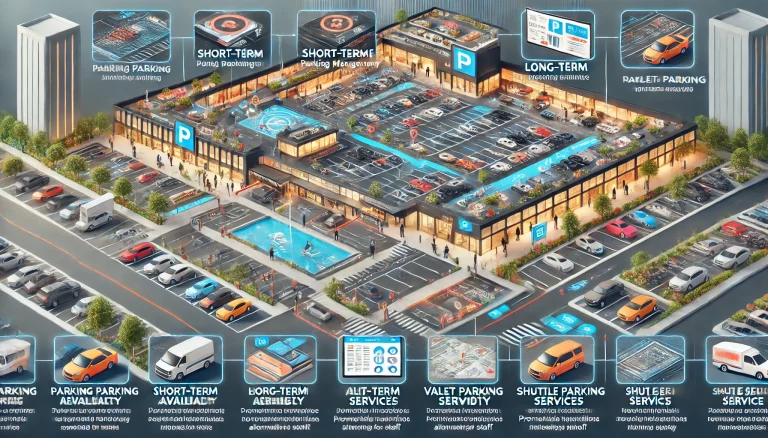
Problem statement:
As urbanization accelerates, parking facilities often fail to accommodate individuals with disabilities. Traditional parking infrastructures lack smart technologies, designated wider spaces, and real-time tracking, making it difficult for people with mobility challenges to find accessible parking. This leads to inconvenience, reduced independence, and potential safety risks.
The future of urban mobility should prioritize equitable access through smart parking solutions that incorporate features like real-time availability tracking, automated reservation systems, and AI-driven accessibility monitoring. By integrating IoT sensors, mobile applications, and adaptive parking designs, cities can provide seamless access to parking spaces designed specifically for individuals with disabilities.
The key challenges include:
- A lack of real-time data on accessible parking availability
- Insufficient wider parking spaces that accommodate mobility aids
- Unauthorized use of disability parking spots
- Cumbersome navigation from parking areas to destinations
- Limited enforcement of accessibility compliance
A smart, inclusive parking system would address these issues by integrating technology with urban planning. The goal is to ensure that disabled individuals can navigate cities independently, safely, and conveniently.
Stakeholders & Their Roles
- People with Disabilities (PwD) – Primary users who require accessible parking.
- Caregivers & Family Members – Assist disabled individuals in mobility and parking.
- Municipal Authorities – Responsible for enforcing accessibility laws and infrastructure.
- Parking Lot Owners & Operators – Manage private and public parking spaces.
- Smart City Planners & Architects – Design urban spaces with inclusivity in mind.
- Technology Providers – Develop IoT-based real-time tracking and smart parking solutions.
- Transportation Departments – Regulate public parking and transportation integration.
- Law Enforcement – Ensure proper usage of disability parking spots and penalize violations.
- Retailers & Businesses – Need accessible parking to serve all customers equitably.
- Ride-Sharing & Public Transit Companies – Integrate their services with accessible parking solutions.
Target Users Definition
- User: People with mobility impairments (wheelchair users, elderly individuals, those with temporary disabilities).
- Age Group: 18-80 years
- Gender: All
- Usage Pattern: Multiple times per week, depending on mobility needs. Users rely on accessible parking for daily commutes, medical visits, and shopping trips.
- Benefit: Users will gain real-time parking availability, ease of access, and reduced stress when navigating city spaces.
Pain Points
- Unavailable Accessible Parking – Designated spots are frequently occupied, sometimes by non-disabled drivers.
- Lack of Real-Time Availability Info – No system to check whether accessible parking spots are available before arrival.
- Insufficient Wider Spaces – Many accessible parking spots do not provide enough room for wheelchairs or mobility devices.
- Unauthorized Use & Poor Enforcement – Non-disabled individuals often misuse accessible parking, and enforcement is weak.
- Difficult Navigation from Parking to Destination – Lack of curb ramps, obstructed pathways, or poorly placed spaces make movement challenging.
- Manual & Inconvenient Payment Systems – Many parking areas lack contactless, app-based, or voice-assisted payment methods.
- No Reservation Option – Users cannot pre-book accessible spots, leading to uncertainty and last-minute hassles.
- Poor Signage & Visibility – Inadequate or unclear signage results in confusion and improper usage of accessible spots.
- Weather & Environmental Barriers – Harsh weather conditions (snow, rain) can make accessible spots unusable due to poor maintenance.
- Lack of Integration with Public Transport – No seamless transition from accessible parking to public transportation options like buses and trains.
1. Key Competitors & Their Offerings
Several companies and startups are actively working on smart parking and accessibility solutions. Below are the key players:
Major Companies & Their Solutions
- ParkMobile
- Mobile app for finding and reserving parking spaces.
- Limited focus on accessible parking but integrates with some city programs.
- Smart Parking Ltd.
- IoT-based smart parking sensors for real-time availability tracking.
- Does not focus on disability-specific needs.
- Bosch Parking Solutions
- AI-powered parking guidance and automated payment systems.
- No dedicated accessibility features.
- JustPark
- Offers pre-booking of parking spots via app.
- Some accessible parking features but lacks real-time tracking.
- Flowbird
- Smart parking kiosks with digital payments and enforcement tracking.
- No significant accessibility innovations.
2. Notable Startups Innovating in This Space
Several startups are working on smart parking and disability-friendly solutions:
- Accessible Parking (Australia) – Developing an AI-powered accessible parking enforcement system.
- Blue Badge Parking (UK) – Creating an app to help disabled drivers find and report accessible parking.
- ParkEagle (Netherlands) – Uses IoT sensors to detect open parking spots, including accessible ones.
- SpotAngels (USA) – Community-driven app that tracks open spots and reports violations.
- Parquery (Switzerland) – Uses AI-based image recognition to detect parking space availability.
- Hikob (France) – Smart parking sensors for detecting and managing spaces in real time.
- Get My Parking (India) – Cloud-based parking management system with potential for accessibility integration.
- Grid Smarter Cities (UK) – Works on real-time curbside parking accessibility solutions.
- AccessibleGO (USA) – Focuses on accessible travel, including parking reservations.
- AIPARK (Germany) – AI-powered smart parking guidance systems.
3. Innovations in Smart Parking for Accessibility
- AI & Computer Vision for Parking Monitoring – Cameras detect unauthorized vehicles in accessible spots.
- IoT-Enabled Real-Time Parking Tracking – Sensors track available accessible parking spaces.
- App-Based Pre-Booking for Disabled Parking – Users can reserve spaces in advance.
- Automated License Plate Recognition (ALPR) – Ensures only registered users park in accessible spots.
- Voice-Controlled Parking Assistance – Helps users with limited hand mobility.
- Contactless & Digital Payments – Reduces the need for physical interactions.
- Smart Curb Management – Dynamically allocates accessible spots based on demand.
- Blockchain for Parking Permits – Prevents misuse of disabled parking badges.
- Weather-Adaptive Parking – Sensors detect environmental barriers (snow, rain) and notify users.
- Integration with Public Transit – Helps users transition from parking to buses/trains.
4. Investment Trends & Market Maturity
Recent Investments in Smart Parking & Accessibility
- ParkMobile acquired by EasyPark (2021) – $300M investment for expansion.
- Flowbird secured $100M funding (2023) – Focused on smart city mobility solutions.
- Parkopedia received $50M investment (2022) – AI-driven parking intelligence.
- Get My Parking raised $10M (2023) – Expansion into global markets.
- Grid Smarter Cities secured $8M (2024) – Accessibility-focused urban parking solutions.
Market Maturity & Gaps
- Smart parking is a growing industry, but accessibility-focused solutions remain fragmented.
- Most companies focus on general parking solutions, leaving a gap for disability-specific innovations.
- Real-time tracking & AI enforcement are still underdeveloped for accessible parking.
- There is an opportunity for a fully integrated, AI-powered, accessible parking system.
Identifying Gaps in Current Solutions
Based on our competition research, the key gaps in accessible parking solutions are:
- Lack of Real-Time Tracking – Most existing solutions do not offer live updates on accessible parking spot availability.
- No AI-Based Enforcement – Unauthorized use of accessible parking spaces remains a significant issue.
- Limited Reservation Options – Few solutions allow pre-booking of accessible parking spaces.
- Poor Integration with Public Transit – There is no seamless transition from accessible parking to public transportation.
- No Personalized User Assistance – People with disabilities may require additional services such as valet options, navigation assistance, or support for visually impaired users.
Product Vision
AccessPark is a next-generation AI-powered smart parking solution designed to make urban parking truly accessible for people with disabilities. Our mission is to eliminate the daily challenges of finding and using accessible parking through real-time tracking, automated enforcement, and seamless integrations.
Our system uses IoT sensors and AI-based monitoring to provide real-time availability of accessible parking spaces. The AccessPark mobile app allows users to locate, reserve, and navigate to the nearest available accessible spot. Additionally, our system prevents unauthorized parking through automated license plate recognition (ALPR) and AI-based enforcement.
Unlike traditional parking solutions, AccessPark integrates with public transport and ride-sharing platforms, ensuring users can transition smoothly from their vehicle to other modes of transportation. We also offer weather-adaptive features, notifying users if parking conditions are unsafe due to snow, flooding, or other environmental factors.
The platform includes blockchain-based digital permits to eliminate permit fraud and unauthorized badge use. Our voice-controlled assistant helps users with limited mobility interact with the system effortlessly.
By partnering with municipalities, private parking operators, and retailers, AccessPark will create a fully inclusive, smart city parking ecosystem. Our goal is to empower people with disabilities by giving them full independence in urban mobility.
With AI, IoT, and blockchain at its core, AccessPark is not just a parking solution—it’s a revolution in equitable urban accessibility.
Use Cases of the Product
- Real-Time Parking Availability Tracking – Users receive live updates on open accessible spots.
- AI-Based Enforcement – Unauthorized vehicles are detected and reported automatically.
- Pre-Booking & Reservation System – Users can reserve accessible parking spots in advance.
- Navigation Assistance – Step-by-step guidance to the selected parking space.
- Seamless Public Transport Integration – Users can transition easily to trains, buses, and ride-sharing services.
- Digital Accessibility Permits – Blockchain-powered verification to prevent fraud.
- Weather-Adaptive Alerts – Notifications about unsafe conditions in accessible parking zones.
- Voice-Controlled Parking Assistance – Hands-free interaction with the system.
- Smart Payment & Contactless Options – Digital payments via app, QR codes, or voice commands.
- Crowdsourced Accessibility Reporting – Users can report issues with accessible parking spaces, helping improve city planning.

